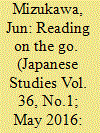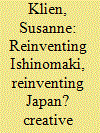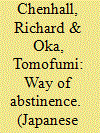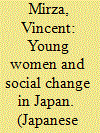|
|
|
Sort Order |
|
|
|
Items / Page
|
|
|
|
|
|
|
| Srl | Item |
| 1 |
ID:
147071


|
|
|
|
|
| Summary/Abstract |
This article examines the program of agricultural cooperative (JA) reform initiated by the Abe administration in November 2013 and ending with draft legislation approved by the Diet in August 2015 for enactment in April 2016. The government linked JA reform to its broader program of economic reform in several ways: as an important item on the agenda of regulatory reform; as a ‘trump card’ in the transformation of agriculture into a growth industry; and as a means to strengthen the international competitiveness of the domestic farm industry in order to facilitate further opening of Japan’s agricultural market. The Abe administration also had an additional, political objective in accomplishing JA reform – to weaken the political power of JA as one of the country’s most formidable and influential pressure groups. This article evaluates the nature of the reform program and its success in achieving its wider economic and political objectives. It argues that the reforms to date are both radical and limited. They are radical because they are unprecedented; on the other hand, they are limited because the extent of the change is relatively circumscribed and therefore its potential to achieve the government’s broader economic goals as well as its narrower sectoral goals is relatively modest.
|
|
|
|
|
|
|
|
|
|
|
|
|
|
|
|
| 2 |
ID:
147067


|
|
|
|
|
| Summary/Abstract |
In Japan the average age of first marriage continues to rise steadily, and people are spending a greater proportion of their adult life single. This is despite the fact that the vast majority of singles express desire to marry one day. The reasons for the rise in late and non-marriage are varied and complex, but difficulty in finding an appropriate or compatible partner has emerged as one of the key issues. Against this backdrop, the konkatsu (‘marriage-partner hunting’) industry has emerged, ostensibly to assist singles to find marriage partners.
|
|
|
|
|
|
|
|
|
|
|
|
|
|
|
|
| 3 |
ID:
147070


|
|
|
|
|
| Summary/Abstract |
This article examines the phenomenon of the cellphone novel in contemporary Japan. In contrast to dominant approaches that have focused on questions of literary merit, I explore the tempos and temporalities of the cellphone novel as reading ‘on the go’. Drawing on ethnographic accounts, I attempt to develop the notion of reading ‘on the go’ so that we may move beyond prevailing discussions of cellphone novels, which have focused mainly on the literary sophistication, or lack thereof, of cellphone novels and novelists. Additionally, I argue that there is underlying tension between ‘literature’ and ‘Literature’ vis-à-vis questions of ‘proper’ reading tempos among Japanese readers. In order to explore the political, ideological, and aesthetic ramifications of changing reading and writing practices, this article places the twenty-first century controversy over cellphone novels in dialogue with a historical precedent, the early modern literary movement known as the unification of spoken and written Japanese (genbun itchi). In so doing, the article examines a corollary relation between changes in literary trends and spatiotemporal transformations that provide a reading and writing environment. Ultimately, the article suggests that the ongoing spatiotemporal reconfigurations and negotiations prompted by the evolving digital media communication network, its infrastructure, and accompanying commercial industries play a critical role in informing how contemporary practices of reading and writing take shape.
|
|
|
|
|
|
|
|
|
|
|
|
|
|
|
|
| 4 |
ID:
147069


|
|
|
|
|
| Summary/Abstract |
This article aims to give an outline of recent developments in Ishinomaki, one of the cities worst affected by the Great East Japan Earthquake in March 2011. Before the disaster, the harbor town faced depopulation, aging residents, and a lack of prospects for the young, like many other stagnant regional cities. Since March 2011, Ishinomaki has seen an influx of short-, mid-, and long-term volunteers and young ambitious individuals who have moved from urban areas to initiate their own revitalization or social business projects. Drawing on and showing the limitations of Richard Florida’s notion of the ‘Creative Class’, this paper approaches Ishinomaki’s recent reinvention and transition from production to postindustrial multi-functionality as a phenomenon that can be seen as both a renaissance movement as well as the result of the structural instability of the labor market caused by Japan’s transition into a mature postindustrial economy.
|
|
|
|
|
|
|
|
|
|
|
|
|
|
|
|
| 5 |
ID:
147072


|
|
|
|
|
| Summary/Abstract |
Stigma associated with alcoholism is common in Japan, and individuals who suffer from alcoholism often feel that it is a taboo to discuss their problems with alcohol in the general public. This paper describes the way in which the self-help group called Danshukai offers a model for recovery for people suffering from alcoholism in Japan. Since 2006, the authors have been involved in various meetings and conducted conversational and semi-structured interviews with leaders and rank-and-file members of Danshukai. In Danshukai, recovery is viewed as a spiritual process offering the potential for a new life compared to models offered by medical treatment that place little emphasis on the role of spirituality in recovery. While medical models seek to reduce alcohol-related stigma by viewing it as a treatable ‘disease’, rather than a personality weakness, Danshukai encourages members to embrace their identity as a Danshukai member and to engage with a ‘way of abstinence’ that includes a lifelong commitment to Danshukai activities and helping others with similar problems.
|
|
|
|
|
|
|
|
|
|
|
|
|
|
|
|
| 6 |
ID:
147068


|
|
|
|
|
| Summary/Abstract |
This paper focuses on the changing definition of marriage for young women in Tokyo over the last 10 years. Based on fieldwork research conducted in Tokyo, I examine why women are delaying or refusing marriage, arguing that women’s decisions can best be understood in relation to work. I discuss how young women negotiate their conception of marriage by articulating their desires for self-realization, a career, and participation in society, within the context of a flexibilization of work and the transformation of family in contemporary Japan.
|
|
|
|
|
|
|
|
|
|
|
|
|
|
|
|
|
|
|
|
|